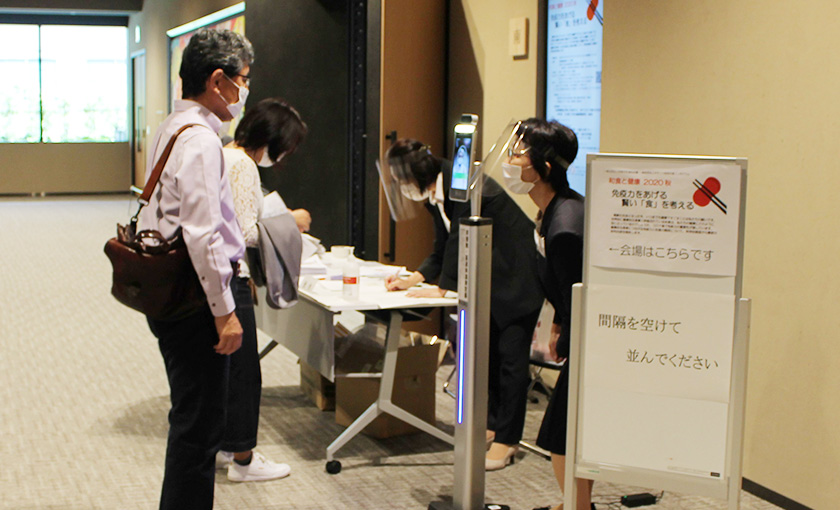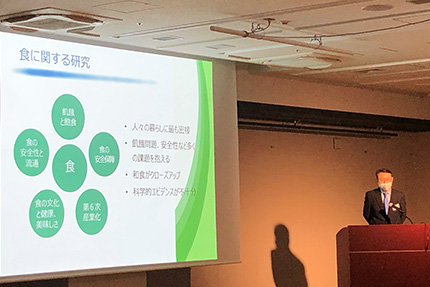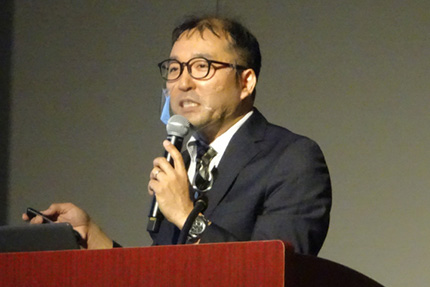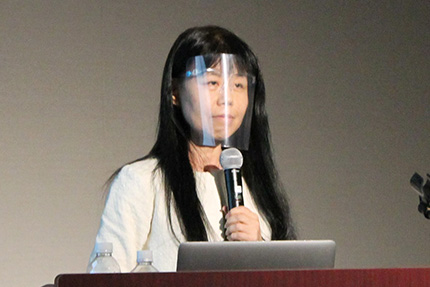HOME > Holding report of recent event > Canon Foundation hosts a symposium on the theme of “smart ‘food’ that boosts immunity"
Canon Foundation hosts a symposium on the theme of “smart ‘food’ that boosts immunity"

On October 13, a joint symposium by the Canon Foundation and Washoku Japan (The Washoku Association of Japan) entitled “Washoku and Health: Examining Smart ‘Food’ that Boosts Immunity” was held at the Kyoto Sangyo Kaikan Hall in Kyoto City.
The two entities have been holding the “Washoku and Health” series of symposium since February 2018 with the aim of conveying the very latest research results on “washoku,” or Japanese food, to the general public in an easy-to-understand manner.
This “Washoku and Health” symposium, the fifth in the series, was held with the support of the Ministry of Agriculture, Forestry and Fisheries, Ishikawa Prefectural University and the National Institution of Advanced Industrial Science and Technology (AIST) and with the cooperation of the Headquarters for Vitalizing Regional Cultures under the Agency for Cultural Affairs.
While each holding of the “Washoku and Health” symposium typically attracts a very large audience, this fifth symposium was held with admission limited to less than one-half of venue capacity with sufficient measures to prevent the spread of COVID-19 in place.
The symposium commenced with a message from Hiroko Nakazawa, Chairman of the Investigation and Research Subcommittee under Washoku Japan. This was followed by a summary description of the Canon Foundation and an introduction of its initiatives geared towards the research of "food" by Canon Foundation Secretary General Tetsuro Hoshino.
Afterwards, two Canon Foundation-funded researchers specializing in food science presented their most recent findings on Japanese food that boosts immunity.
Based on the theme of “Japanese food culture nurtured by traditional fermented foods and the healthy future that they promise us,” Associate Professor Takashi Koyanagi of Ishikawa Prefectural University presented his research results that showed how the significant lactobacilli content of such foods from Japan, particularly traditional fermented foods from Ishikawa Prefecture such as “narezushi” and “kaburazushi” (forms of fermented sushi), improve the intestinal environment and activate immunity.
In her lecture entitled “Japanese food and how it is easy on the intestinal environment and the body: ways to nurture immunity,” Noriko Tsuji, Senior Researcher at AIST, presented on intestinal bacteria in the small intestine, on which there has been little progress in research worldwide relative to the large intestine. In particular, she lectured on how lactobacilli, which constitute major normal bacteria flora, contain anti-inflammatory and infection resistance mechanisms and also contribute to general immunity. She also mentioned how lactobacilli are found in common foods such as pickles and miso soybean paste.
In the panel discussion moderated by Washoku Japan Representative Director Tōru Fushiki, the two researchers took the stage after concluding their lectures to engage in an easy-to understand discussion that was mindful of the presence of general attendees while also touching upon the relationship that intestinal lactobacilli and fermented foods have with Japanese food as well as their relevance to dementia.
Going forward, the Canon Foundation will continue to regularly hold symposiums by its funded researchers for outside participants.













